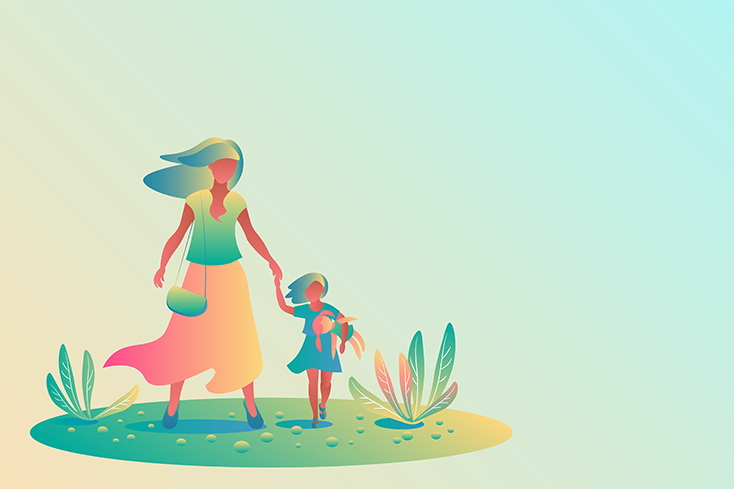 My seven-year-old daughter Isla has big emotions. There is nothing wrong with that, but sometimes, as any parent would, I worry about her worries.
My seven-year-old daughter Isla has big emotions. There is nothing wrong with that, but sometimes, as any parent would, I worry about her worries.
Isla becomes anxious before big events (normal) or when being separated from me and my husband (also normal), but this year I started to notice some behavioral changes that signaled something more serious than everyday worries.
Once, she sneaked food out of the pantry to eat alone, which worried me because I have an eating disorder. She also began to beg to stay home from school almost every day, and sometimes, these moments would turn into huge crying fits during which she screamed at me. When she went to school, she ended up in the nurse’s office every day until her teacher wouldn’t give her a pass.
When her teacher talked to me, I stiffened up. When I was younger, a bit older than Isla now, I would go to the nurse’s office. I wasn’t sick, but I knew that by asking, I could have my mom or grandmother take me home. The nurse called my mom one day and said she thought I had school phobia, a term used for an anxious child who refuses to go to school or avoids school. It turns out that nurse was on to something — I did have a mental health condition (later, I would learn that my behaviors were symptoms of depression and anxiety).
Getting Us Both Help
As the concerning behavior continued, I asked my therapist about getting help for Isla, and eventually, I was able to get her an appointment with a play therapist, who would be able to communicate with and evaluate Isla through play. I believed my daughter was exhibiting signs of a classic case of anxiety.
During our appointment, the therapist asked me, “Do you think this is Isla’s anxiety or possibly your anxiety you’re projecting on to her?”
I answered her right away: “Yes, 100%.” I’m so scared that my kids will inherit my mental health conditions, that I have begun to overanalyze their behavior. I can’t help it.
The play therapist then told me it was too early to worry based on Isla’s history, and that kids tend to repeat behaviors that have a favorable outcome like coming home after a trip to the nurse — so the repeated nurse’s office visits weren’t necessarily a concern. I accepted this answer. It made sense, especially coming from a trained professional.
We spent the rest of the session talking about how we could work on improving Isla’s behavior.
Acknowledging My Fears
Despite the therapist’s reassurance, I started to worry about my daughter again. Was I projecting? Or was something wrong?
It took a lot of thinking, but finally, I arrived at what was really bothering me.
I was worried Isla would turn out like me, meaning she would struggle with multiple mental health conditions. I feared that she might have to fight hard for the right medications and appropriate therapies — that she would have to fight for anything at all.
My fears also stemmed from my concerns about how the pandemic has affected my children. They are under an enormous amount of stress, and I feel like they’ve been shortchanged; in many ways, they’ve had to grow up quickly as they absorbed the trauma of a global disaster.
The pandemic’s effect on this generation’s childhoods is simply unfair. And this upheaval has compounded an already existing youth mental health crisis.
Making Sense of My Past and Moving Forward
While I hold resentments about how my own childhood mental health situation was handled, I can use it as motivation to do better for the next generation. I can’t go back and change things, but what I can do is advocate for both my children. I try hard not to overanalyze and worry about Isla and my son, but the worrying never stops when you’re a parent, especially a parent with anxiety. Still, I owe them my best efforts.
Part of this effort includes remembering that Isla isn’t me. Just because I struggled at a young age doesn’t mean she will. Sometimes, I think that maybe I went through those years to be able to help Isla. If nothing else, I know how to be an advocate and prioritize self-care.
Maybe my daughter won’t have any mental health conditions. Maybe she’ll have a care-free childhood (post-COVID-19) and learn how to tolerate distress. If she does develop a mental health condition, it’s out of my control, and I’m not at fault. All I can do is be the best parent I can, be supportive of my kids, teach them healthy coping skills and hope for the best.
Heather Loeb is a writer and the creator of the Unruly Neurons Blog. She writes mental health column in the Corpus Christi Caller-Times, and her goal is to tell her story in order to eradicate the stigma surrounding mental illness. She also serves as Communications Manager for NAMI Greater Corpus Christi.